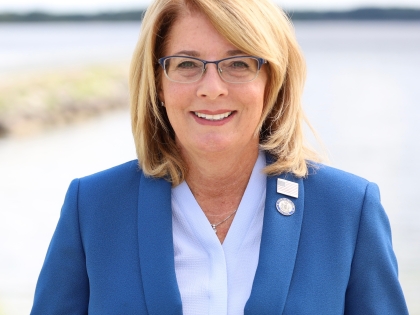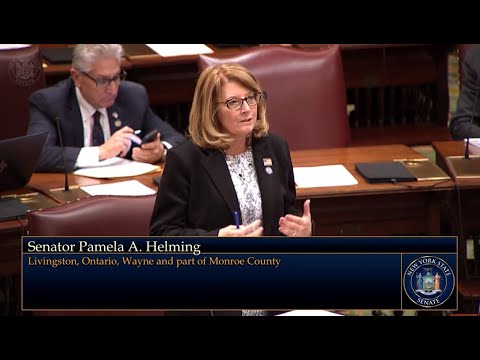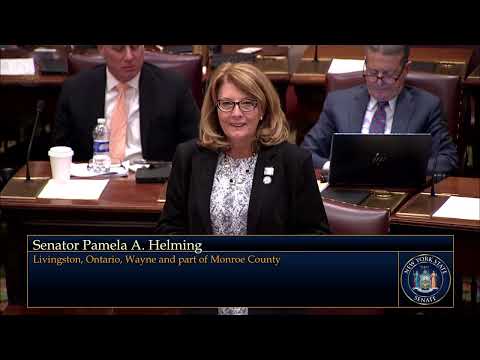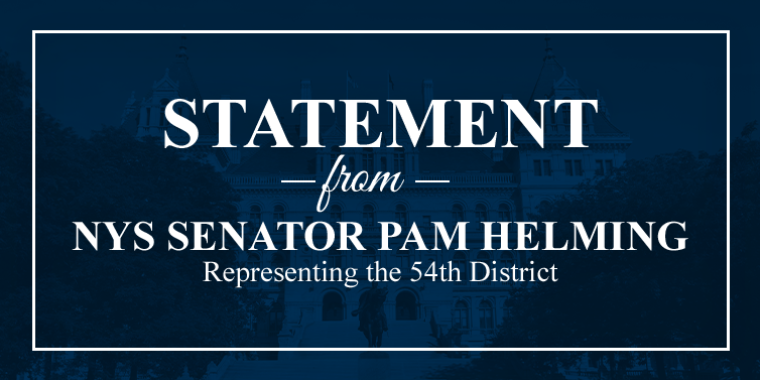
Senator Helming: Our Nursing Home Residents Deserve Better from New York State
May 1, 2020
From the very beginning of this pandemic, the data has shown that people most likely to contract the Coronavirus are our seniors and those with compromised immune systems or underlying illnesses. This is a proven fact and begs the question, has our state utilized the data to make the safest and most informed decisions? When it comes to protecting our vulnerable senior population, I believe New York falls short.
Back in March, the Governor announced the creation of “Matilda’s Law.” This guidance was designed to help protect New York’s most vulnerable individuals including those age 70 and older by encouraging seniors to take certain precautions such as staying home and avoiding visitors. Matilda's Law does not, however, explicitly address seniors living in nursing homes and other adult facilities.
In March, we also saw the Governor take quick, decisive action when he released hundreds of incarcerated individuals considered at risk due to their age or health from jails and prisons across the state.
Yet, as the days and weeks have progressed and the Governor and Commissioner of Health have acknowledged nursing homes as Ground Zero for COVID-19, little has been done to protect the vulnerable residents living in these facilities.
As we now enter into May, we still see little to nothing being done to protect nursing homes and senior living residents. Almost every single day, we continue to hear about questionable practices at some of these facilities which are leading to illness and death. Whether it be state mandates requiring nursing homes with a COVID-19 free environment to accept residents who have tested positive for the virus, or allowing staff who are asymptomatic, but have tested positive to continue working with patients, or keeping residents who have tested positive in the same room as healthy residents, the list goes on.
In response to pressure from individual lawmakers, senior advocates and family members, some steps have been taken to increase transparency and protect residents. Families are being notified of COVID-19 related illnesses and deaths, there is now an independent investigation into the handling of COVID-19 by certain facilities, a new complaint hotline has been established, and employees who have COVID-19 symptoms are no longer allowed to work in these facilities until they test negative.
But is this enough? Absolutely not! We need to continue to pressure the Commissioner of Health to work in partnership with our nursing homes to ensure residents are receiving the quality care they deserve. This includes encouraging nursing homes to share their needs with the Department of Health without the fear of excessive state overreach or retribution. It means stepping up efforts to provide adequate staffing levels and supplies, including personal protective equipment for staff and residents. It means providing technical assistance so that nursing homes have the resources necessary to (visually) connect residents with their loved ones which is especially important at a time when family members are prohibited from personally visiting.
And as the State looks to make cuts to the budget, it is absolutely critical that aid to nursing homes and senior services are not on the chopping block! It is now more important than ever that these facilities receive adequate reimbursement rates and fair funding. It is also imperative that the state continue to support programs that allow our seniors to remain in their (personal) homes and out of long term care facilities as long as it is safely possible.
As our state begins to recover from the COVID-19 pandemic, it is up to us to do more for our nursing home residents and all of our vulnerable populations. They deserve better from New York State.
As always, please do not hesitate to contact my office whenever I may be of assistance. Stay safe.
Share this Article or Press Release
Newsroom
Go to Newsroom
Senator Helming on Martin Luther King Jr. Day 2024
January 17, 2024

2024 Republican Conference Legislative Agenda
January 17, 2024

